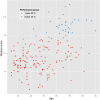Reasoning about social conflicts improves into old age
- PMID: 20368436
- PMCID: PMC2867718
- DOI: 10.1073/pnas.1001715107
Reasoning about social conflicts improves into old age
Abstract
It is well documented that aging is associated with cognitive declines in many domains. Yet it is a common lay belief that some aspects of thinking improve into old age. Specifically, older people are believed to show better competencies for reasoning about social dilemmas and conflicts. Moreover, the idea of aging-related gains in wisdom is consistent with views of the aging mind in developmental psychology. However, to date research has provided little evidence corroborating this assumption. We addressed this question in two studies, using a representative community sample. We asked participants to read stories about intergroup conflicts and interpersonal conflicts and predict how these conflicts would unfold. We show that relative to young and middle-aged people, older people make more use of higher-order reasoning schemes that emphasize the need for multiple perspectives, allow for compromise, and recognize the limits of knowledge. Our coding scheme was validated by a group of professional counselors and wisdom researchers. Social reasoning improves with age despite a decline in fluid intelligence. The results suggest that it might be advisable to assign older individuals to key social roles involving legal decisions, counseling, and intergroup negotiations. Furthermore, given the abundance of research on negative effects of aging, this study may help to encourage clinicians to emphasize the inherent strengths associated with aging.
Conflict of interest statement
The authors declare no conflict of interest.
Figures


References
-
- Orwoll L, Perlmutter M. The study of wise persons: Integrating a personality perspective. In: Sternberg RJ, editor. Wisdom: Its Nature, Origins, and Development. New York: Cambridge Univ Press; 1990. p. 160.
-
- Heckhausen J, Dixon RA, Baltes PB. Gains and losses in development throughout adulthood as perceived by different adult age groups. Dev Psychol. 1989;25:109–121.
-
- Rowley J, Slack F. Conceptions of wisdom. J Information Sci. 2009;23:110–119.
-
- Park DC, et al. Models of visuospatial and verbal memory across the adult life span. Psychol Aging. 2002;17:299–320. - PubMed
-
- Erikson EH. Identity and the Life Cycle. New York: W W Norton; 1980.
Publication types
MeSH terms
Grants and funding
LinkOut - more resources
Full Text Sources
Medical

